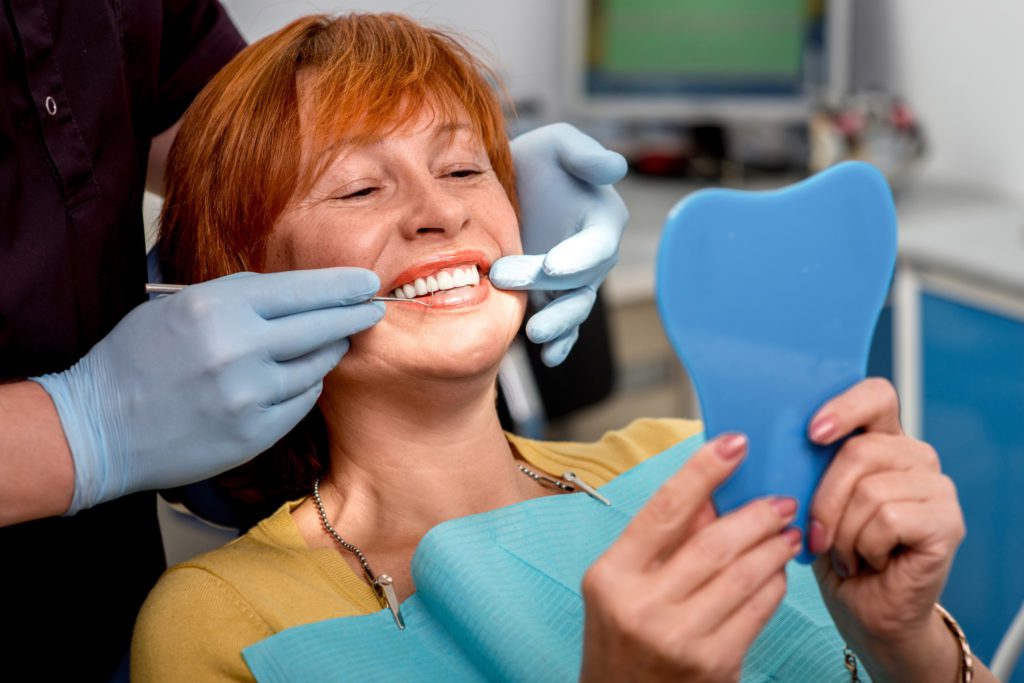Have you been told that you have “hopeless” teeth? Do you hide your smile due to discomfort or embarrassment about your appearance?
Dr. Catherine Wilder and Dr. Lauren Shepard provide full mouth reconstructions to patients in Katy, TX. Full mouth reconstructions, or rehabilitation, use a variety of treatments to restore teeth and gum health. Patients with tooth damage, missing teeth, or advanced gum disease can restore the health and beauty of their smile at Katy Smile Design.
Every patient is different, which is why Dr. Wilder and Dr. Shepard get to know patients as individuals to better understand their needs and aesthetic goals. Patients often undergo a full mouth reconstruction over multiple office visits. Our dentists will create a custom treatment plan for you to find which procedures are needed to rebuild and restore your smile.
Full Mouth Reconstruction Treatments
We utilize different types of treatments to address these dental problems:
Tooth Damage
Tooth damage consists of any chips, cracks, or breaks in your teeth. Damage can also be wear and tear from aging or grinding and clenching your teeth. If you leave damage untreated, it can lead to further advancement of damage to your teeth. Depending on the kind of damage, your teeth are also more exposed to bacteria and infection. If tooth roots are exposed, you’re also going to go through a lot of pain when you eat or drink.
Porcelain veneers, tooth bonding, and dental crowns are all treatments used to address tooth damage. Chips, cracks, and fractures in the tooth enamel may be covered and protected from further damage. Dental veneers are thin shells of porcelain ceramic that are permanently bonded to the front of teeth. Tooth bonding similarly treats damage but is best for chips and cracks in the enamel. Dental crowns are porcelain ceramic caps that fully cover the teeth.
Missing Teeth
Even one missing tooth has a big impact on the rest of your mouth. When you’re missing one tooth, you’re likely to lose more. People with missing teeth are more susceptible to tooth decay and gum disease. Your teeth will also shift and move to try and fill the gap left by your missing ones. If you’ve had treatment to straighten your teeth, you’ll most likely have to get this treatment again. Missing teeth can reverse the effects of it.
Missing teeth lead to an uneven bite as well. The pressure when you bite down isn’t evenly distributed across all of your teeth. Some experience more pressure than others. These teeth are more likely to break or crack under the pressure. Uneven bites are a leading cause of TMJ disorders. TMJ disorders may give you symptoms like jaw and head pain, popping and locking of the jaw joint, and trouble opening and closing your mouth.
Dental implants and implant restorations can restore one or more lost teeth. Tooth implants may also be used to support dental bridges or dentures. Dental bridges are prosthetic teeth that replace multiple missing teeth. Full or partial dentures restore rows or arches of lost teeth. Dental implants ensure single-tooth or multiple-tooth restorations that last for many years to come.
Dental and Gum Infections
Tooth extractions and periodontal therapy are treatment methods that help remove tooth and gum infections. Dental extractions are needed when patients have severely infected teeth that need to be removed. Removing these teeth improves the health of surrounding teeth and lessens the spread of a dental infection. Periodontal therapy addresses gum disease by removing bacterial infections around and beneath the gums.
Infections are seriously detrimental to your oral health if you don’t get treatment. Not only are they painful, but can make your breath smell and cause tooth and bone loss. They make it hard to eat or drink. If you notice any unusual pain, redness, swelling, or bleeding, contact us immediately.
Full Mouth Reconstruction FAQs
What can I expect from a full mouth reconstruction?
A variety of oral surgery techniques, including dental implants, periodontal therapy, Invisalign aligners, porcelain veneers, and other procedures, are a part of full mouth reconstruction. Our dentists will choose and discuss the right sequence for these operations after conducting the initial oral analysis.
How painful is full mouth reconstruction?
During a full mouth reconstruction, patients shouldn’t experience any pain, although the anesthesia will quickly wear off. After the appointment, pain and discomfort typically start to set in and might last for many days. Typically patients can manage their pain using an OTC medication.
How many days off do you need after oral surgery?
We will typically suggest that you rest for at least 48 to 72 hours after the procedure so the treated region can clot. A patient should be able to resume regular physical activity after that. In most cases, the soft tissue will heal completely in 3 to 4 weeks.
Who is full mouth reconstruction best suited for?
Anyone with multiple missing teeth, large fillings, or cracked teeth may benefit from a full mouth restoration. Additionally, it is excellent for those with teeth that undergo severe damage from sports-related accidents or tooth grinding.
Contact Our Dental Office
Want to fully restore your smile? Ask us about a full mouth reconstruction. Request a dental consultation with Dr. Wilder and Dr. Shepard on our website. You can also call our Katy dental office at 281.396.4366.

